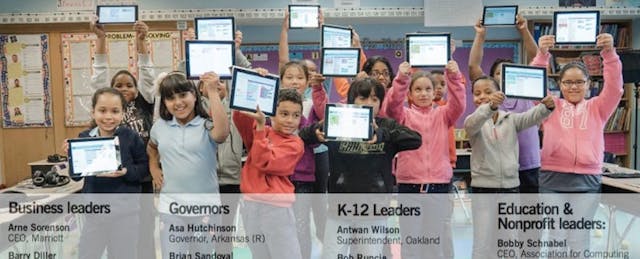Could a single letter win $250 million from the government?
Code.org seems to think so.
The nonprofit has published an open letter and petition to Congress calling for $250 million in federal funding for nationwide computer science education. CEOs and companies across industries—Marriott, John Deere, the College Board and Facebook, to name a few—have signed and proffered $48 million in private contributions to computer science education, with $23 million of that going to Code.org. Twenty-eight governors and ten superintendents also pledged their support. The letter is the product of a collaboration between Code.org and the Computer Science Education Coalition, a nonprofit that lobbies for expanded access to computer science education.
“Whether it’s smartphones or social networks, self-driving cars or personalized medicine, nothing embodies the American Dream so much as the opportunity to change or even reinvent the world with technology,” the letter says. "We ask you to provide funding for every student in every school to have an opportunity to learn computer science."
Code.org has bolstered its own prospects in the process. The Seattle-based nonprofit received donations from Microsoft, Google, Infosys Foundation USA, BlackRock, AT&T, Mark Zuckerberg and Priscilla Chan, Jeff Bezos and the Omidyar Network. Microsoft and Google have each pledged $10 million on top of that to initiatives outside of Code.org, and the Infosys Foundation USA will give $5 million to other nonprofits.
According to CEO Hadi Partovi, Code.org plans to put the funding towards training 25,000 public school computer science teachers every year. The nonprofit sees computer science as key to beginning to solve a number of America’s problems. In a press release, Code.org cited the fact that 16 percent of all new wages in the USA arise from computing fields, but “three-quarters of U.S. schools do not offer meaningful computer science courses,” the release states.
In an interview with EdSurge, Partovi said the $250 million figure is “small enough to be achievable and to not make discernible impact on the federal education budget, but big enough to jumpstart computer science education around the country.” He envisions the $250 million as a one-time investment, a kind of seed funding round.
“We want every school in America to be teaching computer science within years rather than decades,” Partovi added. “It’s a national issue, both of security and economics, and the cost of providing computer science classes is infinitesimally less than being unable to deal with cybersecurity attacks down the road.”
The aim of the petition, Partovi said, is to convince Congress that federal funding should go towards computer science.
“Everyone agrees computer science is important, but the idea of applying federal funding to CS is a bold statement,” he said. “More and more people are behind it. Industry leaders, Democrats and Republicans have signed the petition. We basically believe that since this is so important on so many levels, the government should be funding it.”
That sentiment may seem at odds with the libertarian secessionism of Silicon Valley, but Partovi said the letter and the petition are designed to straddle both sides of the aisle and appeal to a wide range of political beliefs. In a direct appeal to Republicans, the letter states, "This bipartisan issue can be addressed without growing the federal budget."
“We’re not suggesting that schools must be mandated to teach computer science,” Partovi said, “But the government should provide funding to give them that option, and the control will remain at the state level.”
Many of the signatories motivations are economic. The letter emphasizes and juxtaposes the gap between the number of computing jobs—500,000, it says—with the number of computing graduates per year—50,000.
“There is a huge market demand for people with coding experience, mostly outside of tech fields," he said. "The divide is organically solving itself, but only slowly and mostly funded by private donors. K-12 education doesn’t respond to supply and demand or market forces. This field doesn’t deserve a slow response."
The question remains: will all these John Hancocks cajole the legislature?
They could. House Majority leader Kevin McCarthy is interested. Partovi helped him write his first line of Javascript:
Learning how to code with @hadip @codeorg - code literacy is a vital foundation to understanding how our world works pic.twitter.com/94Tgh4lEIm
— Kevin McCarthy (@GOPLeader) April 26, 2016
“It’s an election year, and Congress is Congress, so there’s no way of ensuring that they will do anything,” Partovi said. “But I’ve also never seen anything like it before. I have high hopes.”
The letter is not the first call for Congress to accelerate the speed of the adoption of computer science curriculum. President Obama’s State of the Union address advocated for computer science classes in every school. That wasn’t the start of the groundswell of excitement over computer science, though.
“The State of the Union was a fantastic moment in a movement that’s growing,” Partovi said. “Politicians are starting to enable what teachers want, and 100,000 teachers across the country have decided that this is what they want. No one organization can take credit; teachers played the greatest role.”


